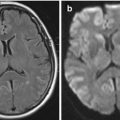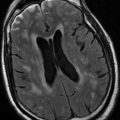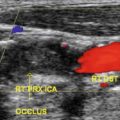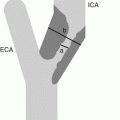, Lawrence A. Zumo2 and Valerie Sim3
(1)
Parkinson’s Clinic of Eastern Toronto, Toronto, ON, Canada
(2)
Silver Spring, Cheverly, MD, USA
(3)
Centre for Prions and Protein Folding Diseases, University of Alberta, Edmonton, AB, Canada
Abstract
During the development of the nervous system, a number of things can go wrong, leading to a variety of developmental anomalies. Some of these are symptomatic from birth and can affect further development and functioning. Others may be asymptomatic or have more subtle effects which do not present until later in life. In this chapter we present several types of structural and developmental anomalies, including Arnold Chiari malformations, Dandy Walker malformation, tuberous sclerosis, mesial temporal sclerosis, arachnoid cysts and Rathke cleft cyst.
Case 6.1 Arnold Chiari Malformation with Syrinx
A 34 year old male presented with numbness of finger tips and lower extremities. He also had headaches associated with coughing. On examination there was hyperreflexia of the lower extremities, bilateral unsustained clonus, equivocal planter responses, and decreased pinprick sensation in the C5 and C6 dermatomes. An MRI was performed (Fig. 6.1).
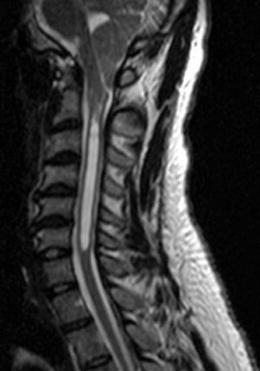

Figure 6.1
Sagittal T2-weighted MRI showing herniation of cerebellar tonsils and syrinx formation within the spinal cord
Explanation and Diagnosis
Figure 6.1 shows herniation of the cerebellar tonsils 2 cm below the foramen magnum and syrinx formation within the spinal cord extending from C2 to C6. These findings are consistent with Arnold Chiari malformation with syringomyelia.
Case 6.2 Arnold Chiari Malformation with Disc Herniation
A 35 year old right-handed female presented with a long standing history of intermittent occipital headaches exacerbated by coughing, sneezing and straining. She also experienced episodes of neck pain without any radicular features. An MRI was performed (Fig. 6.2).
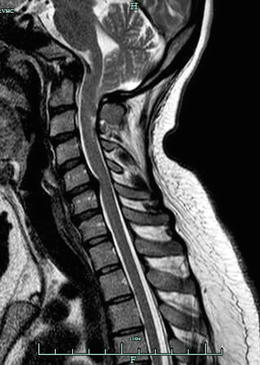 < div class='tao-gold-member'>
< div class='tao-gold-member'>





Only gold members can continue reading. Log In or Register to continue
Stay updated, free articles. Join our Telegram channel

Full access? Get Clinical Tree



